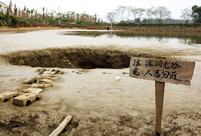

The G7 group of nations may not benefit "if they are hijacked by selfish interests of certain countries", China said on Monday.
Beijing outlined its position after saying that Tokyo sought a special statement from the group to target China on the South China Sea issue.
If the G7 is to continue playing a big role, it should "tackle the issues that the international community has great concern with", Foreign Ministry spokesman Lu Kang said at a regular news conference in Beijing.
The G7 foreign ministers from Britain, Canada, France, Germany, Italy, Japan and the United States ended their two-day meeting in Hiroshima, Japan, on Monday.
Observers said the G7 may be derailed by Japan as all seven member states are outsiders on the sea issue. They said the key goal of such meetings should have been to focus on issues topping the global agenda, including the refugees situation and sluggish global economy.
Although a document on maritime issues that was passed at the meeting on Monday did not name China, it covered areas where the country has disputes or maritime problems with neighbors.
The document said the G7 expressed its strong opposition to any intimidating, coercive or provocative unilateral actions that could alter the status quo and increase tensions.
The Nikkei Shimbun newspaper in Japan said the document targeted China, while Japanese broadcaster NHK said the statement showed the G7 nations' concern over China's actions in the South China Sea.
Liu Jiangyong, deputy dean of the Institute of Modern International Relations at Tsinghua University, said the G7 foreign ministers should discuss economic cooperation, aid to needy countries and the refugee issue.
"However, the meeting has ended up as a steppingstone for the ruling Japanese Cabinet to justify radical new security bills," Liu said.
Lyu Yaodong, a researcher of Japanese diplomacy at the Chinese Academy of Social Sciences, said the G7 meeting had ended up as a stage for Japan's political stance "because Tokyo is protecting its image as a victim of nuclear bombing and whitewashing its role in waging war".
Tokyo has long lobbied African countries to support its bid to reform the United Nations Security Council and make Japan a permanent member.
NHK television reported this month that the African country of Chad had been invited to attend the G7 summit in May.
Lyu said, "This (the ministers' meeting) has drawn a sharp contrast with last year. Japan promised a lot last year at G7 venues on assisting impoverished African countries and helping with construction there."
Over the weekend, the US publicly supported Japan's plan to put the South China Sea issue on the agenda at the G7 foreign ministers' meeting.
Gao Hong, a senior researcher of Japanese studies at the Chinese Academy of Social Sciences, said the US has long expected to reinforce its military presence and that of Japan in both the East China Sea and South China Sea.
"However, Japan has not taken the bold step of embarking on a joint patrol with the US ... in the South China Sea because it knows it is an outsider that is not relevant to the maritime issue," Gao added.
Foreign Minister Wang Yi told visiting British Foreign Secretary Philip Hammond in Beijing on Saturday that the G7 foreign ministers "should not play up the South China Sea issue".
Wang said China hopes Britain will adopt an objective and fair stand on the issue.
 The evolution of J-10 fighter
The evolution of J-10 fighter Top 10 Asian beauties in 2016
Top 10 Asian beauties in 2016 Train rides through blossoms
Train rides through blossoms North Sea Fleet conducts drill in West Pacific Ocean
North Sea Fleet conducts drill in West Pacific Ocean Breathtaking aerial photos of tulip blossoms in C China
Breathtaking aerial photos of tulip blossoms in C China Horrific: Pit swallows 25 tons of fish overnight
Horrific: Pit swallows 25 tons of fish overnight Police officers learn Wing Chun in E. China
Police officers learn Wing Chun in E. China Charming models compete in super model contest in Beijing
Charming models compete in super model contest in Beijing Beauties wearing Tang dynasty costume pick tea leaves
Beauties wearing Tang dynasty costume pick tea leaves Top 20 hottest women in the world in 2014
Top 20 hottest women in the world in 2014 Top 10 hardest languages to learn
Top 10 hardest languages to learn 10 Chinese female stars with most beautiful faces
10 Chinese female stars with most beautiful faces China’s Top 10 Unique Bridges, Highways and Roads
China’s Top 10 Unique Bridges, Highways and Roads The reality of VR shopping
The reality of VR shopping War photographer and mother
War photographer and mother Why does the Western media hate the GFW so much
Why does the Western media hate the GFW so much The 15 vital questions couples should ask before marriage
The 15 vital questions couples should ask before marriageDay|Week